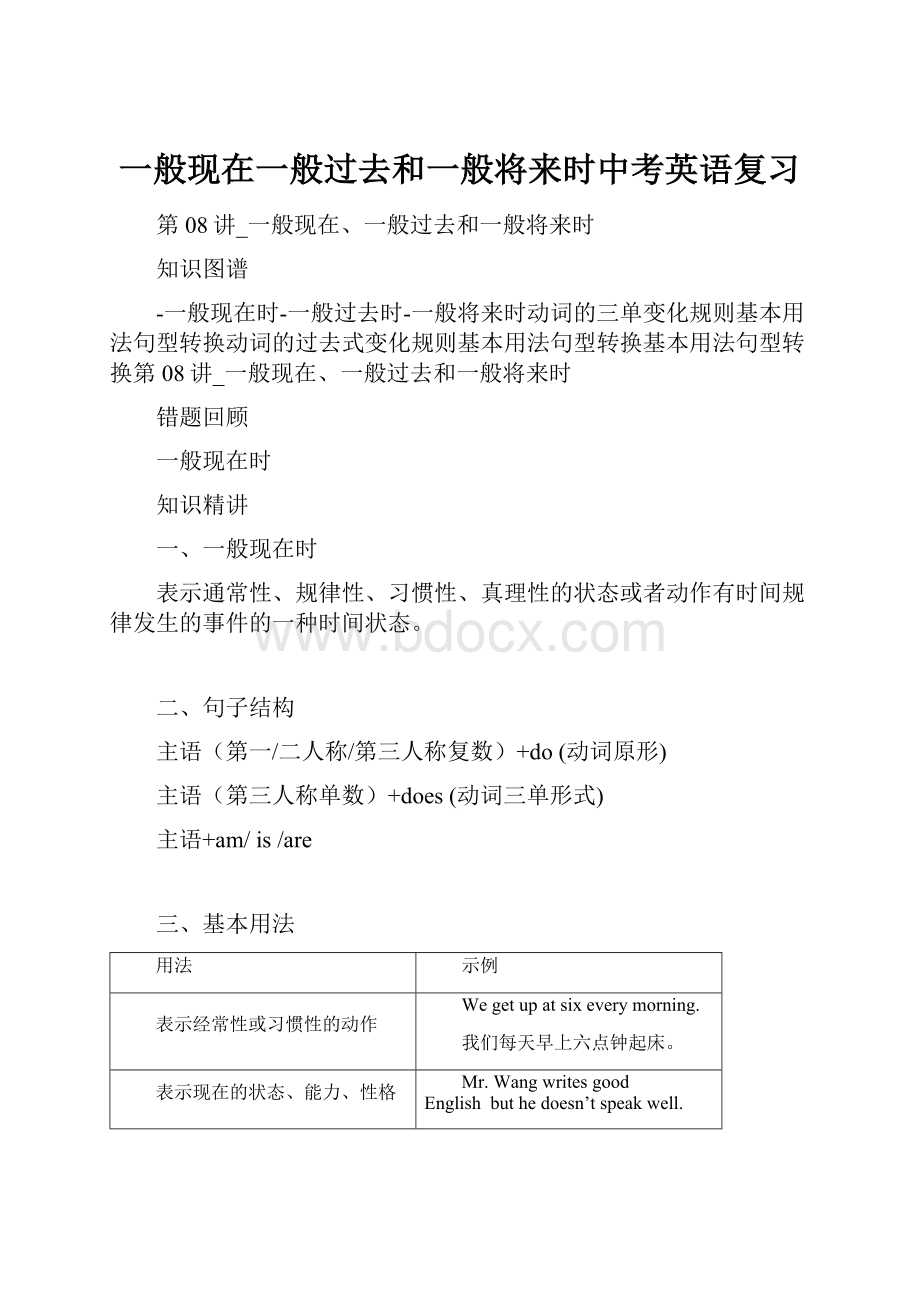一般现在一般过去和一般将来时中考英语复习Word文档格式.docx
《一般现在一般过去和一般将来时中考英语复习Word文档格式.docx》由会员分享,可在线阅读,更多相关《一般现在一般过去和一般将来时中考英语复习Word文档格式.docx(32页珍藏版)》请在冰豆网上搜索。

以x,sh,ch,s结尾
teach-teaches
brush-brushes
以辅音字母+y结尾
变y为i加es
study-studies
try-tries
特殊情况
没有统一的规则
have-has;
be-is
六、相关句式
be动词
行为动词
我是am你是are;
is跟着他/她/它;
复数都用are。
主语是第三人称单数外,都用动词原形;
主语是第三人称单数时,动词词尾加-s或-es。
肯定式
Iamastudent.
我是一名学生。
ShelikesEnglish.
她喜欢英语。
否定式
Iamnotastudent.
我不是一名学生。
Shedoesn’tlikeEnglish.
她不喜欢英语。
疑问式
Areyouastudent?
你是一名学生吗?
DoesshelikeEnglish?
她喜欢英语吗?
简略
回答
Yes,Iam./No,I’mnot.
是的,我是。
/不,我不是。
Yes,shedoes./No,she
doesn’t.
是的,我喜欢。
/不,我不喜欢。
三点剖析
一、考点:
时态是英语学习中的核心内容之一,是英语学习的基础。
自然,时态考查是各种英语考试尤其是中考时的座上宾。
动作发生的时间决定时态,时态决定动词的形式,而考卷中的时态题通常没有给出明确的时间标志词,考试需领悟所提供的语境来做出判断。
只有推断出动作发出的正确时间,才可能正确答题,这就要求考生在熟练掌握时态结构、用法并牢记常用的时间状语的基础上,要充分利用上下文中隐含的信息来捕捉时间,找准答题的突破口。
二、重难点:
一般现在时在考试中的重难点是:
句子结构、基本用法、标志时间状语、动词三单的变化规则及相关句式的变化。
三、补充点:
1.表示按计划或安排好的,或将要发生的动作,可用一般现在时表将来。
但只限于start,begin,leave,go,come,arrive,return,takeplace等。
例:
Mytrainleavesat7:
00thisafternoon.
我乘坐的火车将在今天下午7点离开。
2.在复合句中,当主句是一般将来时,时间或条件状语从句的谓语动词只能用一般现在时来表示将来要发生的动作。
Ifitrainstomorrow,wewon’tgothere.
假如明天下雨,我就不会去那了。
3.以here,there开头的倒装句中,一般现在时表示现在正在发生的动作或存在的状态。
Theregoesthebell.铃响了。
Hererunstheboy.小男孩跑过来了。
题模精讲
题模一动词的三单变化规则
例1.1、
Theyoften_________(play)footballintheplaygroundafterschool.
例1.2、
Mikesometimes_________(go)tothelibrarywithhissister.
例1.3、
Somestudentsareveryactiveand_________(do)exerciseandeveryday.
例1.4、
Nick_________(notclean)hisroomonweekdays.
例1.5、
Thesun________(rise)intheeast.
题模二基本用法
例2.1、
Mygrandpa_________awalkaftersuppereveryday.
A、
willtake
B、
takes
C、
took
D、
hastaken
例2.2、
WangMei_________musicandoften_________tomusic.
likes;
listens
like;
listen
arelistening
liking;
例2.3、
Everyyear,thousandsoffarmers______tobigcitiestofindjobs.
go
went
havegone
willgo
题模三句型转换
例3.1、
Tomoftenhelpshisparentsdohouseworkathome.(改为否定句)
____________________________________________
例3.2、
AmylikesreadingEnglishnovels.(改为一般疑问句,作否定回答)
_____________________________________________
随堂练习
随练1.1、
Jim_________(be)veryclever,andallofhisfriendslikehim.
随练1.2、
School_________(start)ateighto’clock.
随练1.3、
Mrs.Read_________(clean)thewindowsonceaweek.
随练1.4、
_________youusually_________(get)upatsixinthemorning?
随练1.5、
Who_________(speak)Englishbestinyourclass?
随练1.6、
Theboy_________(wash)hisclothestwiceamonth.
随练1.7、
Itusually_________(take)meaboutonehourtofinishmyhomework.
随练1.8、
Theearth_________(move)aroundthesun.
随练1.9、
Mr.Green_________(has)aradio.
随练1.10、
Myfatheralways_________backfromverylate.
come
came
iscoming
comes
随练1.11、
Mygrandpa_________young
looks
islooked
look
islooking
随练1.12、
Alice_________tothelibrarywithherfriendsonSundays.
want
wanted
wants
iswanting
随练1.13、
They_________longhairandbigeyes.
do
does
has
have
随练1.14、
IfBob_________awayfromthejunkfood,hewillbeingoodhealth.
stay
willstay
stays
doesn’tstay
一般过去时
一、一般过去时
表示过去某个时间里发生的动作或状态;
过去习惯性、经常性的动作、行为;
过去主语所具备的能力和性格。
主语+did(动词过去式)
主语+was/were
表示过去发生的动作或状态
Myfamilyhadapicnicintheparklastweekend.
我们全家人上周末在公园有个野炊。
表示过去经常或反复发生的动作或状态
Whenshewasyoung,sheusuallywenttothe
librarytoreadbooks.
当她小的时候,她经常去图书馆看书。
表示过去的情况或状态
Therewasasmallpoundintheschoolbefore.
之前学校这里有个小池塘。
四、时间状语:
1.yesterday,thedaybeforeyesterday
2.时间段+ago:
threeyearsago,longago…
3.last:
lastday/week/year…
4.in+过去年份:
in2015…
5.justnow刚才
五、一般过去时动词过去式的规则变化
加-ed
work-worked,
listen-listened
以不发音的e字母结尾
直接加-d
live-lived,
receive-received
重读闭音节结尾的
双写词尾辅音字母加-ed
stop-stopped,
chat-chatted
以辅音字母加
y结尾
变y为i
再加-ed
study-studied
以元音字母加
直接加-ed
enjoy-enjoyed
六、一般过去时动词过去式的不规则变化
变化类型
A---A---A型
(现在式、过去式和过去分词同形)
costcostcost花费
cutcutcut割,切
readreadread读
hithithit打
letletlet让
putputput放下
A---A---B型
beatbeatbeaten
打
A---B---A型
comecamecome来
becomebecamebecome变
runranrun跑
A---B---B型
burnburntburnt
燃烧
learn
learned/learnt
learned/learnt学习
buildbuiltbuilt建筑
loselostlost失去
lendlentlent借给
spendspentspent花费
paypaidpaid付
laylaidlaid下蛋
saysaidsaid说
bringbroughtbrought带来
buyboughtbought买
thinkthoughtthought想
sleepsleptslept睡
keepkeptkept保持
sweepsweptswept扫
standstoodstood站
understandunderstood
understood明白
catchcaughtcaught抓住
feelfeltfelt觉得
findfoundfound发现
havehadhad有
getgotgot得到
holdheldheld盛,握
leaveleftleft离开
makemademade制造
meetmetmet遇见
sellsoldsold卖
telltoldtold告诉
teachtaughttaught教
sitsatsat坐
flyflewflown飞
A---B---C型
eatateeaten吃
fallfellfallen落下
givegavegiven给
taketooktaken拿
seesawseen看见
writewrotewritten写
rideroderidden
骑
drivedrovedriven驾驶
throwthrewthrown抛,扔
blowblewblown
吹
growgrewgrown
生长
knowknewknown知道
stealstolestolen偷
drinkdrankdrunk饮
choosechosechosen
选择
forgetforgotforgotten忘记
beginbeganbegun开始
ringrangrung
按铃
singsangsung唱
swimswamswum游泳
drawdrewdrawn拉,绘画
showshowedshown展示
speakspokespoken
说话
breakbrokebroken
破碎,折断
其他不规则动词的变化
be(am,is)was/werebeen是
gowentgone去
lielaylain躺
dodiddone做
wearworeworn穿
七、相关句式
主语是单数用was,复数则用were。
所有人称,都用动词过去式did。
Hewasafarmer.
他过去是一名农民。
Hewentfishingyesterday.
他昨天去钓鱼了。
Hewasn’tafarmer.
他过去不是一名农民。
Hedidn’tgofishingyesterday.
他昨天没去钓鱼。
Washeafarmer?
他过去是一名农民吗?
Didhegofishingyesterday?
他昨天去钓鱼了吗?
Yes,hewas./No,hewasn’t.
是的,他是。
/不,他不是。
Yes,hedid./No,hedidn’t.
是的,他去了。
/不,他没去。
一般过去时的基本用法以及动词过去式的规则变化和不规则变化。
二、易错点:
be(is,am,are)动词本身就是独立的谓语动词,不能与行为动词的过去式同时使用。
不少学生经常出这样的错误。
Itwasrainedyesterday.(错误)
Itrainedyesterday.(正确)
过去式动词不存在第三人称单数的问题。
也就是说,一般过去时的句子中,无论主语是什么人称,单数还是复数,统一为动词的过去式。
三、补充点
在时间状语从句和条件状语从句中,用一般过去时表示过去将来的动作。
HesaidhewouldcomeifIpromisedtowaitforhim.
他说如果我答应等他,他会来的。
题模一动词的过去式变化规则
写出下列动词的过去式形式。
1.am/is
_________
do
_________
go
have_________
2.isn’t
aren’t
spend_________
cook_________
3.read
clean
live
study_________
Myfather_________illyesterday.
isn’t
aren’t
wasn’t
weren’t
---______he______hislunchlastnight?
---Yes,hedid.
Does;
has
Did;
have
had
Didyou_________
tothenationallibrary
last
week?
goes
goed
Lucy
did
her
homework
at
home.(改为否定句)
_________________________________
I
read
an
interesting
book
about
historylastnight.
(改为否定句)
____________________________________
例3.3、
He
found
some
meat
in
the
fridge.(变一般疑问句)
例3.4、
There
was
orange
juicein
cup.(变一般疑问句,并作肯定回答)
例3.5、
ShesawLiLeijustnow.(变一般疑问句,并作否定回答)
随练2.1、
read______
is______
随练2.2、
He______(study)intheuniversityfouryearsago.
随练2.3、
Mybestfriend______(take)asmallpresenttomejustnow.
随练2.4、
Attheendoftheday,thescienceteacher______(is)veryhappybecausetheclassmonitorcleanedthebusafterthetrip.
随练2.5、
PaulandI______(play)tennisyesterday.HedidmuchbetterthanI.
随练2.6、
Hissister______(tell)astorytohisdaughterlastSunday.
随练2.7、
随练2.8、
take______
play______
随练2.9、
arrive______
do______
随练2.10、
study
______
see______
随练2.11、
teach
change______
随练2.12、
sleep
come______
一般将来时
一、一般将来时
表示将来某一时刻的动作或状态,或将来某一段时间内经常发生的动作或存在的状态。
主语+will/shall+do/be(动词原形)
主语+be(is/am/are)goingtodo/be(动词原形)
will/shall+do
表示将要发生的动作或存在的状态
(往往指事先未思考或计划过的意
图)。
英式英语中sha